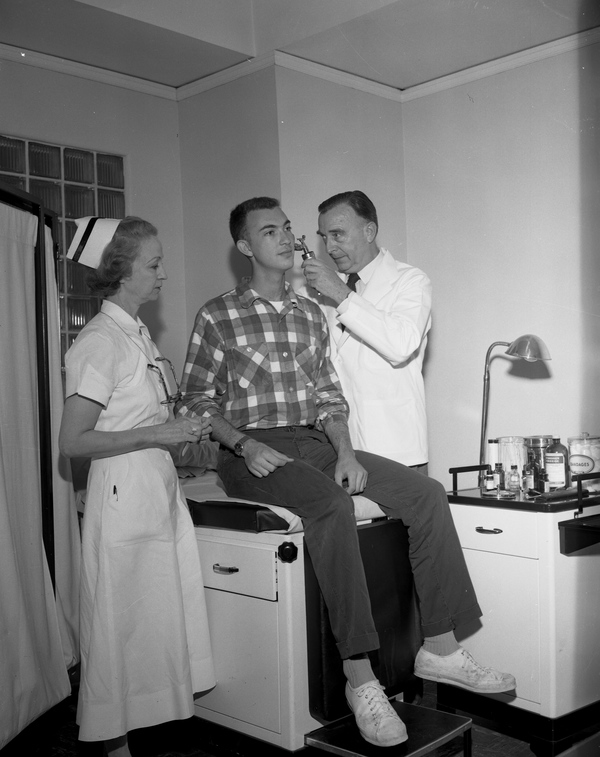Description of previous item
Description of next item
So You Wanna Be a Doctor
Published February 2, 2019 by Florida Memory
Your physician or surgeon is definitely someone you want to be able to trust, but how do you know you can? Since Florida’s earliest territorial days, the government has required medical professionals to demonstrate their qualifications and be licensed in some way. The rules have changed a lot over the years, however, which makes for some interesting reading.
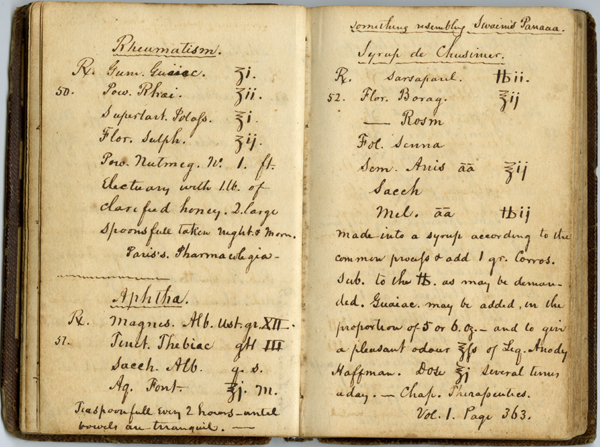
Pages from the journal of Dr. John M.W. Davidson of Gadsden County, describing treatments for various diseases (Collection M81-24, State Archives of Florida). Click or tap the image to see a larger version of the image and a transcript.
After Andrew Jackson formally took possession of West Florida on July 17, 1821, he immediately began passing ordinances laying out a new set of rules for the territory. In September, he issued an ordinance “for the preservation of health in the city of Pensacola” establishing a Board of Health for the city and granting the board powers to license physicians and make rules regulating the practice of medicine. When the territorial legislative council met for the first time the following year, the members passed an act establishing new boards of health in both Pensacola and St. Augustine, although the new law did not specifically say whether the boards would license physicians or not. They did, however, specify that all persons practicing law or medicine within the territory would pay $10 in licensing fees. That was a lot of money in the 1820s! The silver lining? Doctors were not liable for jury or militia duty.
Starting in 1824, the territorial legislative council got a little more serious about qualifications for doctors. That year, the council passed an act requiring anyone practicing medicine to file with the local county clerk either a copy of their diploma and a “certificate of moral character” or a certificate showing he had studied physiology or surgery for at least two years, either at a college or under the supervision of a reputable doctor or surgeon. If a prospective doctor went this latter route to be licensed, he also had to get the endorsement of two county judges.
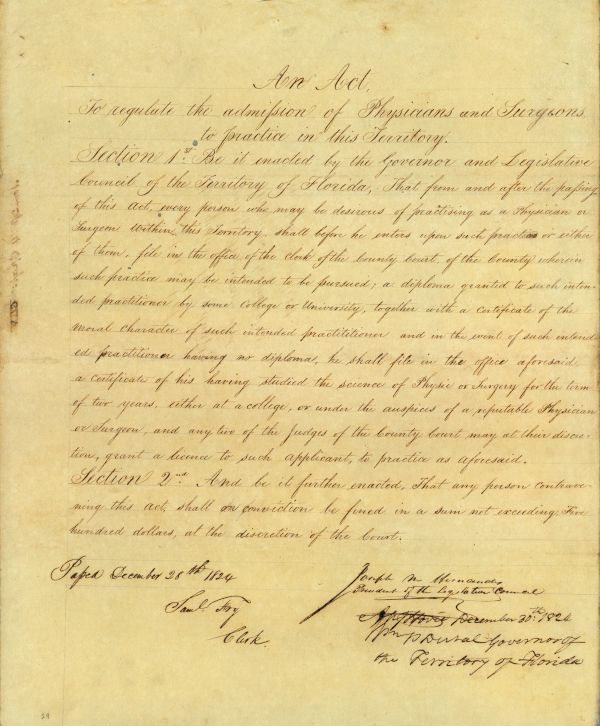
An Act to Regulate the Admission of Physicians and Surgeons to Practice in This Territory, 1824 (Series 222, State Archives of Florida). Click or tap the image to view a larger version.
On December 31, 1827, the legislative council established a territory-wide board of health called the Medical Board, initially consisting of Richard Weightman and William H. Simmons of St. Augustine, Robert A. Lacy of Key West, William D. Price and Lewis Willis of Tallahassee, Malcolm Nicholson of Gadsden County, William P. Hart of Jackson County, and C.Y. Fonda and John Brosnaham of Pensacola. All physicians wanting to practice medicine in Florida were supposed to come before the board for examination to be granted a license. If the applicant had a degree from “some regularly established medical university within the United States,” however, he did not have to take an examination.
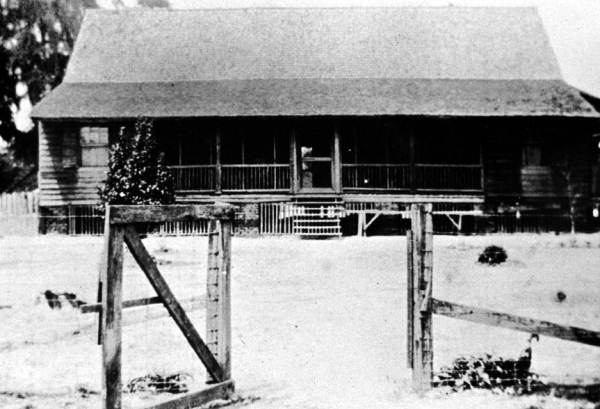
Home of Dr. Malcolm Nicholson of Gadsden County, one of the first members of Florida’s first territory-wide board of health, the Medical Board (1899).
The Medical Board proved burdensome to many would-be applicants, since by law it was to meet exclusively in Tallahassee. In 1831, legislators rectified the situation by abolishing the board and offering physicians three routes to a medical license. An applicant could either (a) file a diploma from a medical college with the local county clerk, (b) file a certificate of competency signed by two licensed Florida doctors, or (c) file evidence of having completed “one course of lectures” at “some medical college,” accompanied by a certificate of competency from just one licensed Florida doctor. This certainly made getting a medical license easier, although there were still cases where some prospective physicians had trouble meeting the requirements, as we see with the following case involving Dr. John W. Robarts of Tampa. Robarts had no medical degree, yet 166 Hillsborough County residents asked the legislature to grant him a special license in 1854. Why he was unable to obtain a certificate of competency is not known, although there are other cases where a doctor who relied on herbal or other alternative methods found it difficult to get this kind of support from fellow physicians.
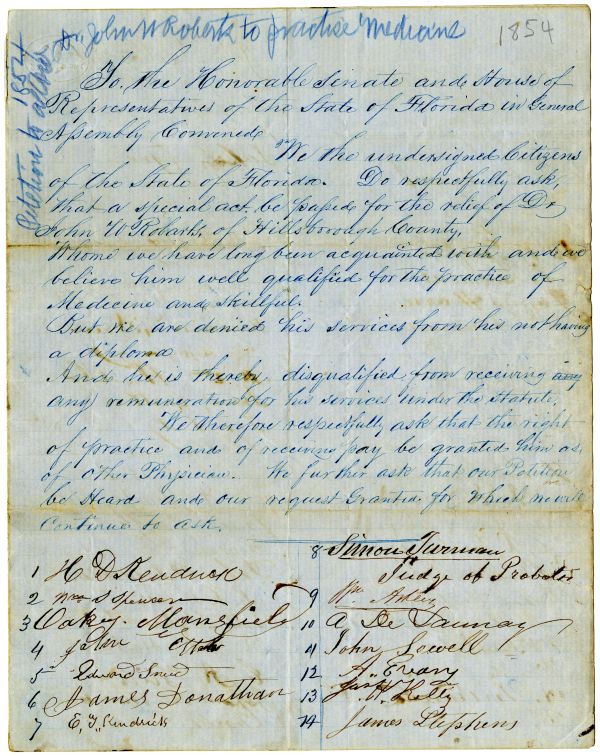
Petition signed by 166 citizens of Hillsborough County asking the legislature to issue a special license to Dr. John W. Robarts (Series 2153, State Archives of Florida). Click or tap the image to view the complete document.
This system continued with relatively few changes for more than half a century, but over time concerns about “quack” doctors and harmful patent medicines led the state government to get even more deeply involved. The growth of the state and its far-flung geography played a role as well. In 1881, legislators passed an act creating six boards of medical examiners headquartered in Tallahassee, Jacksonville, Pensacola, Key West, Ocala and Tampa. The boards were to examine any persons not possessing a medical degree who wished to practice medicine, surgery or obstetrics in the state. If the applicant passed the examination, he was to enter a copy of the board’s certificate into the records of his local county clerk.
The 1881 law required the six boards to examine applicants in five key areas: anatomy, operative and minor surgery, obstetrics, diseases of women and children and “the general laws of health.” The State Archives holds copies of minutes from the meetings of the examining board based in Pensacola (Series S1321), which contain some of the questions they asked each applicant in the 1890s. Here are a few examples, some of which really show their age. How many can you answer?
- Give the effect of chloroform on the system.
- What are the antidotes for strychnine poisoning?
- State the object of the circulatory system.
- What are the symptoms and treatment of smallpox?
- What is formed when you combine in a prescription potassium iodide and bichloral mercury?
- How may it be known [in the process of delivering a baby] that labor has begun?
In 1889, legislators revamped the system and began requiring all doctors to have a medical degree and sit for an examination. In 1905, they abolished the six separate examining boards and established a statewide Board of Medical Examiners, which still operates today as the Florida Board of Medicine. The questions have gotten a little more complex, as today’s doctors can attest, but the object is the same–to protect the public and maintain a high standard of quality among Florida’s health care professionals.
Is there a doctor somewhere in your family tree? Check out our webinar on researching your ancestor’s occupation to learn how to find out more!
Cite This Article
Chicago Manual of Style
(17th Edition)Florida Memory. "So You Wanna Be a Doctor." Floridiana, 2019. https://www.floridamemory.com/items/show/342051.
MLA
(9th Edition)Florida Memory. "So You Wanna Be a Doctor." Floridiana, 2019, https://www.floridamemory.com/items/show/342051. Accessed February 26, 2025.
APA
(7th Edition)Florida Memory. (2019, February 2). So You Wanna Be a Doctor. Floridiana. Retrieved from https://www.floridamemory.com/items/show/342051

 Listen: The World Program
Listen: The World Program